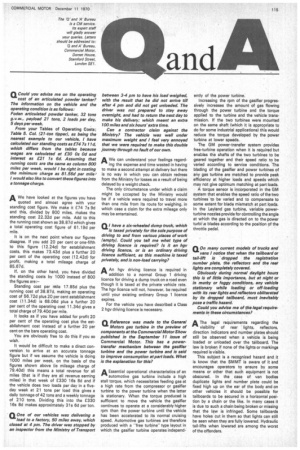and
Page 117

If you've noticed an error in this article please click here to report it so we can fix it.
aCould you advise me on the operating cost of an articulated powder tanker? The information on the vehicle and the operating condition is as follows:
Foden articulated powder tanker, 32 tons g.v.w., payload 21 tons, 2 loads per day, 5 days per week.
From your Tables of Operating Costs; Table 5. Col. (21-ton tipper), as being the nearest example to our vehicle, I have calculated our standing costs as £74 7s lid, which differs from the tables because wages are calculated at £30 Os Od and interest as £21 is 5d. Assuming that running costs are the same as column 800 miles per week, would I be right in costing the minimum charge as 81.56d per mile,' I would also like to convert these figures into a tonnage charge.
AWe have looked at the figures you have
quoted and almost agree with your standing cost figure. We make it £74 7s 9d and this, divided by 800 miles, makes the standing cost 22.32d per mile. Add to this the running cost shown as 38.87d which gives a total operating cost figure of 61,19d per mile.
It is on the next point where our figures disagree. If you add 20 per cent or one-fifth to this figure (12.24d) for establishment costs, this makes 73.43d plus a further 20 per cent of the operating cost (12.42d) for profit, making a total mileage charge of 85.67d.
If, on the other hand, you 'have divided the standing costs by 1000 instead of 800 the figures are:—
Standing cost per mile 17.85d plus the running cost of 38.87d, making an operating cost of 56.72d plus 20 per cent establishment cost (11.34d) is 68.06d plus a further 20 per cent of the operating cost 11.34d gives a total charge of 79.40d per mile.
It looks as if you have added for profit 20 per cent of the operating cost plus the establishment cost instead of a further 20 per cent on the bare operating cost.
You are obviously free to do this if you so wish.
It would be difficult to make a direct conversion to arrive at an accurate tonnage figure but if we assume the vehicle is doing 1000 miles per week, on the basis of the figures shown above (ie mileage charge of 79.40d) this means a total revenue for all miles that is if they are all revenue earning miles) in that week of £330 16s 8d and if the vehicle does two loads per day in a fiveday week at 21 tons per load this gives a daily tonnage of 42 tons and a weekly tonnage of 210 tons. Dividing this into the £330 16s 8d makes approximately 31s 6d per ton.






























































































































































